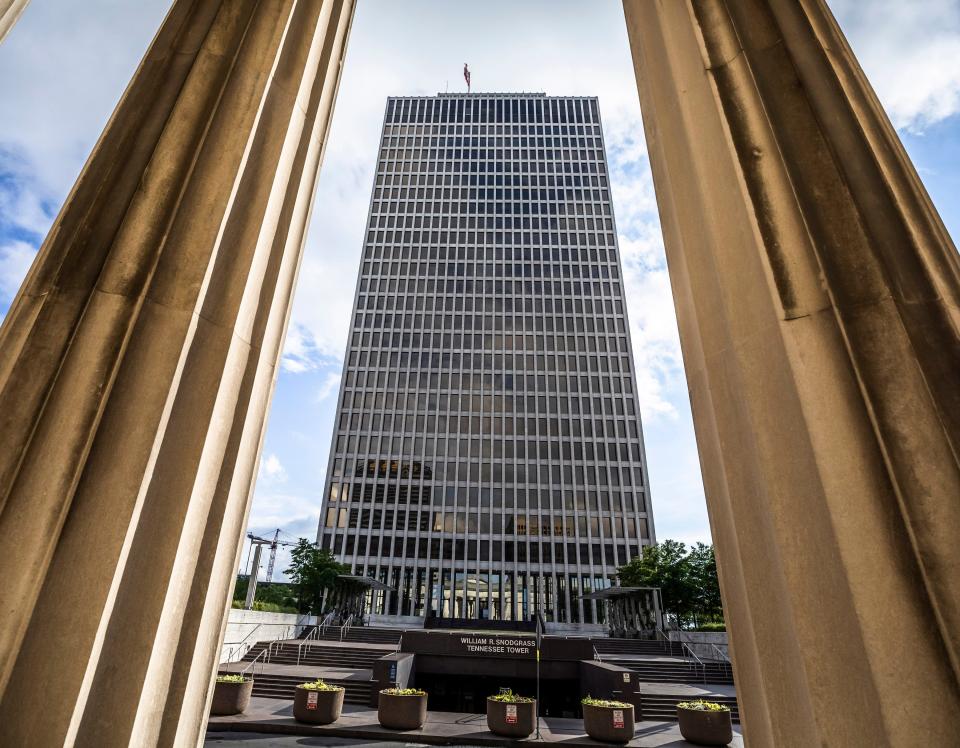'Project Tetris': How shifting work habits are changing the state's real estate footprint
As workplace norms continue to evolve after the coronavirus pandemic, the state of Tennessee has undertaken a massive office space consolidation effort to use state-owned real estate more efficiently.
They’re calling it “Project Tetris.”
“This is like an enormous puzzle,” Department of General Services Commissioner Christi Branscom told The Tennessean in an interview. “Sometimes the puzzle pieces have fit exactly like what we thought it would, and sometimes they haven’t. But the good news is it’s still going on. … The return on investment there is enormous.”

Since coming on as commissioner in 2019, Branscom – whose background is in real estate – has worked to develop a master plan to manage the state’s properties and leased spaces more efficiently. The coronavirus pandemic sped up the process.
In September 2020, General Services' State of Tennessee Real Estate Asset Management division began reviewing departments' space usage looking for ways to use state-owned spaces more efficiently, eliminate excess space, and return it to the market.
“Someone – I don’t even remember who it was – said it was like playing a game of Tetris. And so we called it Project Tetris internally for a really long time,” Branscom said. “We tried to think of a fancy name or acronym or something, but every time we talked about it, we would call it Project Tetris.”
Tennessee has become a national leader in its real estate management: at least eight other states have consulted with the Department of General Services about how they can implement similar changes.
Project Tetris’ downsizing efforts are projected to save the state about $156 million in operating expenses over the next 10 years, Branscom said. That doesn’t include the savings in leases that the state will no longer have to pay as agencies move out.
“It’s very meaningful,” she said. “In the state of Tennessee, the most expensive thing we do is real estate. And so if we can reduce our costs in real estate, then we are really impacting tax dollars and how those can be deployed in different ways.”
How the pandemic changed the state’s workspace strategy
Several state agencies had already moved to a system of Alternative Work Schedules before Lee took office as a way to allow state employees more flexibility. The goal was to reduce the state's real estate needs by allowing work from home, mobile work, and free address scenarios.

When Lee took office in 2019, he supported continuing the model.
Then, in March 2020, the coronavirus pandemic brought the world to a standstill. But state agencies kept working.
"We picked up our laptops, went home, and just kept on working," Branscom said. "And then these commissioners who had not really engaged with AWS saw, 'Oh my gosh, my people are actually working really well from home or from wherever they are. This is great.'”
Branscom credits the state's partial transition to alternative work schedules before the pandemic for agency's ability to transition to from-home work smoothly amid the crisis.
“We had a much easier transition in our state than all the other states did," she said.
Then, in 2020, the governor called on departments to cut their budgets by 12% to shore up the state’s fiscal stability amid the pandemic economic hit.
“All those departments — like DHS, DCS, the Department of Mental Health and Substance Abuse Services, Labor and Workforce Development, especially, and Commerce and Insurance — everybody was like, 'Oh my gosh, this is when our Tennesseans need these programs the most. We can't cut our programs,'" Branscom said. "So I started getting phone calls from other commissioners saying, 'Hey, can we cut out real estate to get to 12%? And I was like, absolutely. So we started right-sizing departments."
How much space has the state downsized?
State agencies have already eliminated 780,000 square feet of state-owned office space, and eliminated the need for 300,000 square feet of leased space. Through Project Tetris, Branscom hopes to to shrink state office usage by another 1 million square feet.
The goal is to complete the project by the end of 2025 or early 2026.
Citizen Plaza, a state-owned building at 400 Deaderick Street previously used for agency offices, is already empty and on the market for sale. The James K. Polk building at 505 Deaderick Street, where the Tennessee Performing Arts Center is located, will also be emptied by 2025.
The State Building Commission approved $200 million to relocate TPAC to Nashville's East Bank neighborhood last week.
General Services has prioritized consolidating offices into spaces that are convenient and well maintained. It's also worked to keep agencies that work closely with other agencies physically near each other.
“The Tennessee Tower is well-maintained and in good condition, and its proximity so close to the Capitol makes it a preferred asset for continued state ownership,” the agency said in a statement. “However, the original design and construction and the deferred maintenance at the James K. Polk building make it less desirable for state staff and more expensive to maintain.”

So far, the state has consolidated office space or moved agency offices for TennCare, the Department of Human Resources, the Department of Revenue, the Department of Financial Institutions, the State Board of Education, the Charter School Commission, a Department of Children's Services Field Office, the Department of Finance and Administration, and the Secretary of State's office.
Consolidation and moving efforts are ongoing for the Tennessee Housing Development Agency, Department of Environment and Conservation, Department of General Services, the Department of Health, and the Department of Education. In 2024 and 2025, the Department of Treasury, Department of Children's Services, and Department of Transportation will be consolidated or moved, among others.
“You wouldn’t be able to do this kind of strategy in another capital, such as Springfield, Illinois, or Pierre, South Dakota,” she said. “It can work when your capital is located in a very desirable area."
Is alternative work schedules here to stay?
While downsizing the state’s office footprint is bringing in loads of savings now, what happens if a future governor or commissioner wants to move back to a fully in-person model for state employees?
Branscom said she doesn’t see a point in the future where administrators, accounting and IT staff all come back into the office full time with a dedicated desk.
“There could be one day who comes back and says I want to put everyone back in an office,” she said. “That would cause some dramatic changes and it would be expensive for the state. I think probably the expense of that would be enough to go – maybe not everybody back in the office.”
In the future, Branscom said, she also wants to work to reduce state-owned surface parking in downtown Nashville.
“When I arrived, I was like ‘this is insane’ – we have all these surface lots in the middle of Nashville,” she said.
The state is working to renovate Legislative Plaza – the maze of space located under War Memorial Plaza, facing the state Capitol downtown. That project is approved and moving forward.
“We’re going to create even more collaboration space, and also more hotel and office space, basically where you can land, work and whatever you need to do there in the office,” Branscom said.
“The goal has been to be fiduciaries of these taxpayer dollars,” she said. “These are these are tax dollars and we need to make sure that we're doing the right by them.”
Vivian Jones covers state government and politics for The Tennessean. Reach her at vjones@tennessean.com or on X and Threads @Vivian_E_Jones.
This article originally appeared on Nashville Tennessean: Tennessee: Shifting work habits changing state's real estate footprint

